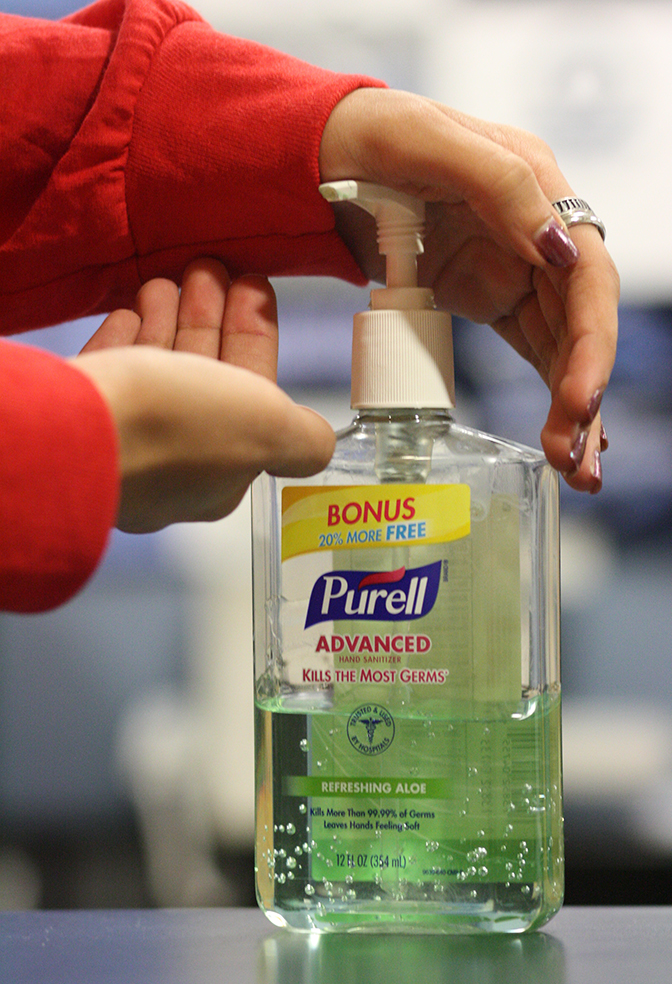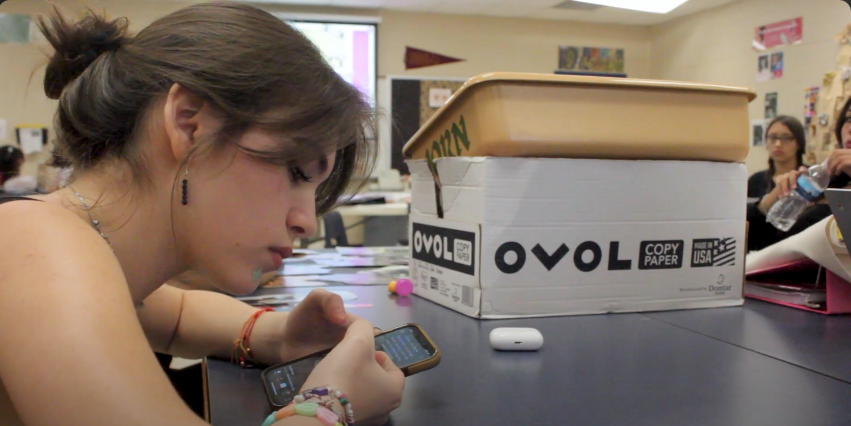by Emma Fitzhugh and Mahek Khetani | editors
While the epidemic of Ebola continues to afflict international travelers, two skin infections – Impetigo and MRSA (Methicillin-resistant Staphylococcus Aureus) have been positively identified at at least two NEISD high schools.
“One of the cases occurred right as school was ending; it was determined that a student had something – the [coach] wasn’t sure what it was. They asked the parent to go check it out, that was coming from our nurse, and she checked it out and said well they have this infection; impetigo,” principal John Mehlbrech said.
Immediately after it was confirmed that one student did have a case of impetigo, an email was sent on Oct. 21 informing parents of the situation.
“An email was just sent out to everybody and said this is here, just be careful, you always want to clean hands. These are always here, you know that. These infections are always on campus. Everything you touch, they’re full of germs. So that’s why we always wanna make sure we remind our kids; wash hands, don’t share clothing,” Mehlbrech said.
In addition to this email, a separate email was then sent on Oct. 24 to a more specific community of parents.
“The impetigo, that was a wrestling thing. We brought the wrestling coach in – he’s notified, we sent a letter [email] out to the wrestling parents, the wrestlers, and I sent one out generically to the community. So we directed to make absolutely sure that the wrestlers knew about it, because they had direct contact with the student, and we went in and scrubbed everything,” Mehlbrech said.
In addition to informing the community, a thorough sanitation of both the athletic and fine arts building was conducted as soon as the case of impetigo was confirmed, shortly followed by a second sanitation routine when a separate case of Staph was confirmed.
“I think, because I’ve been here for a while, the parents kind of understand that I send these messages out just as a precautionary measure, just to inform them that this is going on, that I’m not hiding anything, [or] trying to shun away from any issue. So I think they kinda trust a little bit about what I say to them, to say this has happened, we do have it [skin infections] here; everything’s okay. We’ve done this, we’ve sanitized every area where the student might’ve been, and just make sure that you take caution,” Mehlbrech said.
As principal of the school, Mehlbrech went on to explain how he would rather provide parents, as well as their students, with factual information rather than ensue speculation about these issues.
“Well you always have to take caution, but I’m the kinda guy that errs on the side of caution, because I’d rather have you be aware of it then not. Because nothing remains a secret. And I’d rather it come from me, that can tell you the truth, then to create a story when you don’t know the information. So I always wanna take the lead in that,” Mehlbrech said. “You know, it depends on who you ask if they even knew about it or not. We tell obviously, the coach directly involved so they [coach] can get it out to their people. The same with the other issue [MRSA], the same kinda deal took place. So that way we’re covering our basis on all sides.”
But for some athletes, including senior wrestler William (Billy) Green, skin infections don’t seem to be that uncommon, although impetigo does have certain symptoms.
“One of the wrestlers had impetigo; usually if it’s a rash, it kinda bubbles up a little bit so you go to the doctor and he’ll tell you whether it’s infected or not. Then usually once it starts to heal, it’ll start scabbing up. I mean it’s a common thing for wrestlers, so it’s not that big of a deal. Usually whoever has it [skin infection] will let the coach know. This is the first time we’ve had impetigo. It’s really not that serious, but it could spread so they [coaches] just told us clean out your lockers, we’re gonna sanitize everything,” Green said.
But this was not the first time that the wrestler’s lockers were sanitized.
“This is the second time we’ve had to clean out our lockers this year. The first time was I believe, I don’t think it was our football team, but a football team had Staph, so in order to prevent further breakout we had to clean out our lockers, all that kind of stuff. That was about two or three weeks ago,” Green said.
Green went on to say how he was not sure how the wrestler caught impetigo in the first place, since wrestling season hasn’t started yet. But as long as the wrestlers continue to practice personal sanitation, the infection shouldn’t be a concern, according to Green.
“If they shower, they won’t have to worry about it [impetigo], because I mean it’s a really easy thing to prevent as long as you are sanitary. Before we practice we clean the mats; anytime before we use them we clean them. We also shower after every practice, or any workout really. You gotta make sure you have clean clothes afterwards,” Green said.
Whether impetigo is really as contagious as it seems, if it’s confirmed that a wrestler has a skin infection, they will no longer be able to participate in any tournaments.
“In wrestling, skin infections are kind of a big thing because you can’t wrestle in a tournament if you have it, you know, ringworm, staph, impetigo, all that stuff, and it’s one of the main things in wrestling; you’ve gotta be sanitary. You don’t want a skin infection because that’s a big, major thing that can keep you out of wrestling in a tournament,” Green said.
In addition to impetigo, another skin infection was then confirmed, but was not transmitted between students.
“Actually when you deal with MRSA, you can have it genetically. You get it checked out by your doctor, in fact that’s how we found out the one person had MRSA. The student had some issues that they went and checked out after having surgery and what have you, but they found out that it’s in the student’s genetics. So you can be a carrier of it,” Mehlbrech said. “Even if you get a deep abrasion or a cut and you have that gene, you can get MRSA, without touching anything or without contacting anybody. You never know when it pops up. It’s just that when it does, we just take the extra precaution. We sanitized everything, we had the custodians that evening clean everything, we tell the kids to wash their clothes, just to be on the safe side.”
However, these contagions do not seem to be life-threatening, according to Mehlbrech.
“We have to obviously maintain our sanity. You know, Ebola is a national threat and everybody’s excited about it. But in reality, if you think about Ebola, if people were not taking precautions, it’d be a concern. But they are. We are not gonna have to worry about it in San Antonio. But every kid that comes on a plane, from anywhere around the world, could have it. Are we gonna sit around the house and worry about it? Well you’d drive yourself nuts if you did that. What we do is we make sure that we keep ourselves aware, and always know that it’s there. But we can’t think about it constantly because all it’ll do is just make you paranoid,” Mehlbrech said.
Similarly, Mehlbrech went on to say how he feels as though it is not his obligation to make students more aware of the recent spread of infections, but acknowledging the fact that these contagions are present, and choosing to take proper sanitary precautions, is up to the discretion of each student.
“I’m not here to say should kids be more aware of it, should kids be more alert about it. I think they [students] need to know what it is, but I don’t think they should be so concerned that they become paranoid, and then they decide not to do anything. Because that’s not how we live. And when you talk about the number of people that go through this facility, you’re always gonna have potential germs floating around, the flu bug, the cold, whatever that’s contagious is around. It just depends upon your immune system, and how it reacts to it, [that] can make a difference in how sick you get,” Mehlbrech said.
Although these infections do have the potential of spreading, there seems to be no reason to go into a “panic mode”, according to Mehlbrech.
“This is not something that we have to be so overly concerned that we have to lockdown the building and call school off, and get everybody to go home and take a shower. It needs to be just common sense stuff, and that’s what we do- we live our life. We do common sense stuff: wash your hands, clean your clothes, don’t share, simple things like that,” Mehlbrech said.














